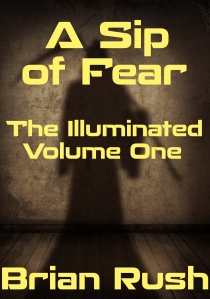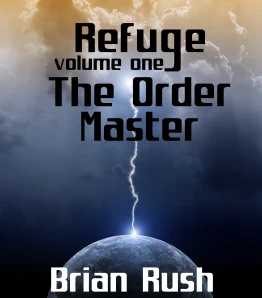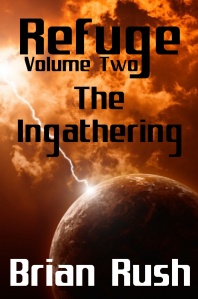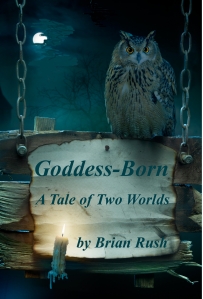
As noted in the title, I have to thank one of my favorite science fiction writers, David Brin, for the inspiration for this post. And that’s although (or perhaps because) I strongly disagree with what he’s saying, or, more accurately, believe he’s missed the point.
In token of thanks, I’ll begin with a quote from Brin’s blog, “Contrary Brin.” You can read his entire post here.
The trend toward feudal-romantic fantasy may seem harmless. Heck, I enjoy Tolkien and steam punk and some of the best fantasists. But dreaming wistfully about kings and lords and secretive, domineering wizards is a sugary path that leads ultimately to betrayal. Because kings and lords and wizards were never our friends! Indeed, for most of history they were the chief plague destroying hope for humankind.
I’ll also refer to a couple of essays that Brin co-wrote for Salon, one on Tolkien’s The Lord of the Rings and the other on Star Wars, in which he denigrated the political implications of those two works of art. But the above paragraph captures the argument in a nutshell, and contains two implicit assumptions which underlie this argument and which are both false, one obviously, the other requiring a bit more thought to see through:
Assumption No. 1: Fantasy consists of “dreaming wistfully about kings and lords.” (I excise the “wizards” because I rather suspect Brin does not believe they actually existed. Certainly if they did exist, they were not on the same plane of visibility as the kings and lords and tended to be burned at the stake.) Setting aside the “dreaming wistfully” business, this is obviously untrue because not all — these days, not even most — fantasy has any “kings and lords” to dream about, “wistfully” or otherwise. The biggest sub-genre of fantasy today is contemporary fantasy, which is set in the modern world, with its nations governed by democratic republics (what we see around us for the most part), not by monarchs.
Assumption No. 2: The important thing that fantasy has to say involves politics. This requires a bit more thought — one can’t see the fallacy here merely by glancing at the fantasy offerings at Amazon — but it’s equally wrong. It’s a perfectly understandable mistake coming from a science fiction writer, because the important thing that science fiction has to say often does involve politics. But that isn’t true of fantasy. Politics in fantasy is part of world-building, which is to say, part of the background; it’s no more thematic than a description of the clothes people wear or the kind of liquor they drink or those cute maps of the fantasy world that fantasy authors have enjoyed putting into their books ever since Tolkien did it. If a story is set in a primitive, medieval or ancient setting, then naturally the government is going to consist of “kings and lords,” and to depict it otherwise would be unrealistic (barring some fantasy explanation, which would then need to be gone into). If a story is set in the modern world, though, those same kings and lords would be equally unrealistic and out of place. Either way, the point the story is making has nothing to do with kings and lords, or with elected officials either. Those elements, which would be central to a science fiction story, are peripheral in fantasy.
To answer my title question, fantasy can be, but need not necessarily be progressive, and whether it is or not, its progressivity (or lack thereof) is peripheral to what the story is trying to say. The theme of good, serious fantasy is spiritual, not political. It may be moral, it may be about personal growth and development, it may be about facing our own demons and the potential for evil within, it may be about the temptations of power or wealth and what they can do to a person and the need to rise above them, it may be about mystical transformation and apotheosis. These are things that are sometimes fatuously referred to as “timeless verities.” They are not verities. They are timeless questions, questions that cannot be answered by reference to scientific method, and whose answers, once discovered, cannot be communicated except by the medium of metaphor and myth — which, of course, is what fantasy is. In the end, each of us must discover these truths for ourselves, and at best myth can provide some helpful guideposts on the way.
(Come to think of it, the political questions that lie at the heart of the best science fiction can’t be answered through scientific method, either, although they come a little closer. For example, science can tell us — as a matter of fact — that a heavy industrial hand applied to an ecosystem risks extinguishing species whose evolutionary descendants may someday be uplifted to fly starships. What it cannot tell us is whether this predictable outcome is a good or bad thing. We must make that judgment ourselves through extra-rational means.)
Now, what I’m going to do is go into the two fantasy works that Brin chose to write about in those Salon articles, The Lord of the Rings and the Star Wars movies. (The latter, despite the trappings, are fantasy, not science fiction. For one thing, their “science” is pathetic. Rather more to the point, their central themes are clearly spiritual, not political.)
Let’s begin with Tolkien’s magnum opus. I’m going to quote a paragraph from Brin’s Salon essay, not because he would probably recognize it as central (unlike the one above), but because I see it as embodying the main error he’s making:
Wouldn’t life seem richer, finer if we still had kings? If the guardians of wisdom kept their wonders locked up in high wizard towers, instead of rushing onto PBS the way our unseemly “scientists” do today? Weren’t miracles more exciting when they were doled out by a precious few, instead of being commercialized, bottled and marketed to the masses for $1.95?
Is it not obvious where this attempt to set up the lure of fantasy preparatory to knocking it down in favor of a modern, scientific, and enlightened approach fails? All of the above paragraph is written from the perspective of an ordinary person. But fantasy is not written from the perspective of an ordinary person. It’s written from the perspective of a king, or at least a prince or princess; of a wizard; of someone who used to be an ordinary person but is propelled by circumstances into becoming something more. (Incidentally, for all his protestations, that’s equally true of Brin’s fiction. His characters may not be feudal nobility or royalty, but they are all a cut above the average. Indeed, it would be hard to write a good story about a truly average person.)
Remember, the political and social organization of a fantasy story is not central, not thematic, it’s just world-building background. The lure is not “Wouldn’t it be cool if we could live in a pre-scientific world,” but rather, “If we were confronted with these challenges, what would we do?” One can set such a story in any background, and as already noted, much fantasy nowadays is set in our own world, not in the primitive past.
Which does not, however, describe The Lord of the Rings, so let’s return to that.
In The Lord of the Rings, a sub-plot involves the failure of the royal line of Gondor and the rise of one of the main characters, Aragorn, to assume Gondor’s throne. This ascension, along with the fall of Sauron, brings about a golden age. One might be excused for thinking this makes LotR a paean to monarchy, especially if one knows that the author had leanings that way. One would, however, be wrong, because the main plot line and the theme of the story is something completely different having nothing to do with kings.
Actually, in Tolkien’s fantasy world, unlike the real one, a decent argument in favor of hereditary power can be made; Aragorn is not altogether human, being descended from the daughter of an Elf and a minor deity. He really is superior by birth. But that’s neither here nor there, because the whole true-king business is peripheral to the actual story, which involves the lure of power.
Also, for all the fact that Tolkien himself in his real life was a critic of industrial modernity, we should remind ourselves that Sauron was not a new thing in his fantasy world, and therefore hardly an emblem of modernity or enlightenment. He was an ancient evil that turned up long before human beings — or even Elves — existed. Part of the transition that takes place in the course of the book is the end of these ancient things. Sauron gets his butt kicked, and the Elves disappear into the West. It’s time for the Dominion of Men. But again, this is world-building backdrop, not central to the story.
The story is about the One Ring. This is a marvelous mythical device on so many levels. Let’s start with how it came to be made, which is background to the story.
Sauron, way back in the Second Age, wanted to rule the world. He especially wanted to rule the Elves. His scheme to do this involved giving them the magical equivalent of software with a programming back door that he could exploit. He went in disguise among the most powerful and capable of the Elves and taught them cool stuff. With the knowledge that Sauron gave them, the Elves made the Rings of Power.
Then Sauron pulled his fast one. He made a Ring of his own, designed to dominate and control all of the other Rings and their users. The scheme didn’t work, because the Elves got wise to it and took off their Rings and stopped using them. All it did was to ruin relations between them and Sauron, which had been going well up to that point.
Here’s the first lesson. Sauron could have had all kinds of influence with the Elves and benefit from his relationship with them. He gave them useful knowledge and they were grateful. But by trying to exercise absolute power over them instead, he lost everything he could have gained.
Now fast forward to the final war against Sauron. The unthinkable happens: he loses the One Ring! Not only does this mess up his big scheme, but it also chops his own power down to size and sets things up for the story told in Tolkien’s main narrative. The Ring is found later on by Gollum, then accidentally passed on to Bilbo, and from Bilbo to Frodo, and the plan takes shape to destroy it and end Sauron’s power forever.
The Ring is power. It’s a great temptation. It was made by Sauron for his own use, but it can be used by anyone with a very strong will, who is prepared to devote himself to exercising power over others. Resistance to the power of the Ring and ultimately giving it up and destroying it are the story here, not anything to do with kings or wizards, except insofar as those kings and wizards resist (or fail to resist) the lure of the Ring. The story is Gandalf, Aragorn, Faramir, and Galadriel all refusing to take the Ring; Saruman, Boromir, and Denethor falling to its influence; Frodo struggling to carry it to its destruction and ultimately failing so that only a power beyond himself can bring about the events that lead to victory.
The Lord of the Rings does not call upon us to fantasize and romanticize about medieval life. Nor does it call upon us to rise above it and embrace modernity. It has nothing to do with the central political struggle of the past few centuries in our own real world. It takes no sides in that struggle, but deals instead with something else altogether: the lure and danger of personal power. We do not put ourselves in the place of some peasant of Rohan cowed into obedience to King Theoden and his nobles, because they hardly come into the story. Instead, we put ourselves into the place of the main characters, and in doing so we neither make nor think about any simplistic one-to-one comparison between the political and social institutions in the story and our own. Because that has nothing to do with what the story is about. We make a mythic connection not with the literal story elements (I think it’s safe to say that none of us will be tasked with the near-impossible destruction of an artifact of power made by the Dark Lord), but with the broader implications regarding facing the temptation of power, which, in one form or another, faces people in all worlds and in all settings.
Brin’s error in regard to Star Wars is a bit more complicated. He has a problem with the whole idea of the Force, it would seem, not on a scientific level (we suspend disbelief, of course) but because it elevates an elite with superhuman powers, whether those powers are employed with compassion (as the Jedi) or ruthlessness (as the Sith). He has a more specific (and well-taken) objection to some of the philosophy expressed by Yoda, to the effect that human emotions such as fear and anger lead inevitably to evil, even when the anger is directed against evil itself, and to the way the story absolves Darth Vader so easily after all his crimes merely because he rediscovers love and does not betray it in the end. (In view of the fact that Vader dies in the final movie, we may reasonably question whether or not he is “absolved” and in what way.)
When evaluating fiction — especially when the story is told in film, which is an especially visual medium — it’s sometimes important to get past what the characters say and look at what is shown. In the first three episodes, the Jedi Order is dominant in the Republic and follows the philosophy that Yoda expresses to Luke in the later/earlier films (and which Yoda also expresses in the first three episodes).
This philosophy destroys the Jedi Order.
The Jedi are called upon to suppress their humanity. They are not allowed normal human emotions. Critically for the story line, the Jedi are a celibate order. Anakin Skywalker, by falling in love with Padme Amidala, marrying her, and getting her pregnant, breaks Jedi rules. His pathological fear of losing her is the lever that Palpatine uses to turn him to the Dark Side. But this only works because he cannot go to his Jedi mentors for advice and help! He cannot ask Obi-Wan or Yoda how to deal with his fears, at least not with any specificity, because he must keep his relationship with Padme a secret. His only recourse is Chancellor Palpatine. Because of this, he turns to the Dark Side and becomes Darth Vader, and the Jedi are destroyed.
Regardless of anything Yoda says, that is what the movies show. Yoda’s philosophy is the fatal flaw that ruins the Jedi and brings about the Empire.
Consider the prophecy about Anakin, “A prophecy that misinterpreted may have been,” as Yoda says — and he is right. Anakin, the “chosen one,” is supposed to “bring balance to the Force.” It’s an interesting choice of words. The Jedi assumed it meant that the “chosen one” would bring them total victory over the Sith, and the end of the Dark Side, but that’s because they could not see their own fatal flaws. In the course of the movies, the prophecy comes true but in an unexpected way. Anakin first destroys the (unbalanced) Jedi, and then, years later, destroys the (equally unbalanced) Sith by killing the Emperor and dying himself. This leaves his son, Luke, free to rebuild the Jedi, hopefully without repeating the same mistakes.
What is the lesson here? It is that spirituality divorced from humanity becomes diabolical. We have an implicit recognition that the philosophy Yoda expresses is flawed.
Fantasy is not inherently anti-progressive. It isn’t even inherently medieval or ancient in setting. In fact, none of my own fantasy books has a medieval setting. The Star Mages is contemporary/futuristic, and A Tale of Two Worlds is (partially) set in an early-modern society in the course of making the transition from ancient/medieval governing structures to modernity. In Goddess-Born, the Kingdom of Grandlock undergoes a democratic revolution, the monarchy is overthrown and a republic created (with some magic-borne hiccups along the way). But that is not the theme of Goddess-Born, it’s just a part of the backdrop that emerges logically from any early-modern society governed by a monarchy.
Depending on the setting, fantasy can describe anything from a completely primitive, pre-civilized, hunter-gatherer society, to a futuristic science-fiction type setting. It can also go off completely into fantasy-land and describe something that is utterly unlike any human society in history or our likely future (as Shakespeare did in A Midsummer Night’s Dream). Regardless of what world it depicts, however, the theme of fantasy is almost always spiritual rather than political, personal rather than collective, and neither progressive nor regressive but timeless.
Image credit: rolffimages / 123RF Stock Photo











